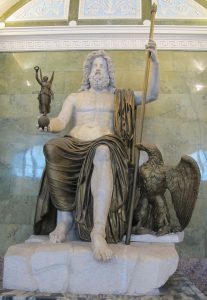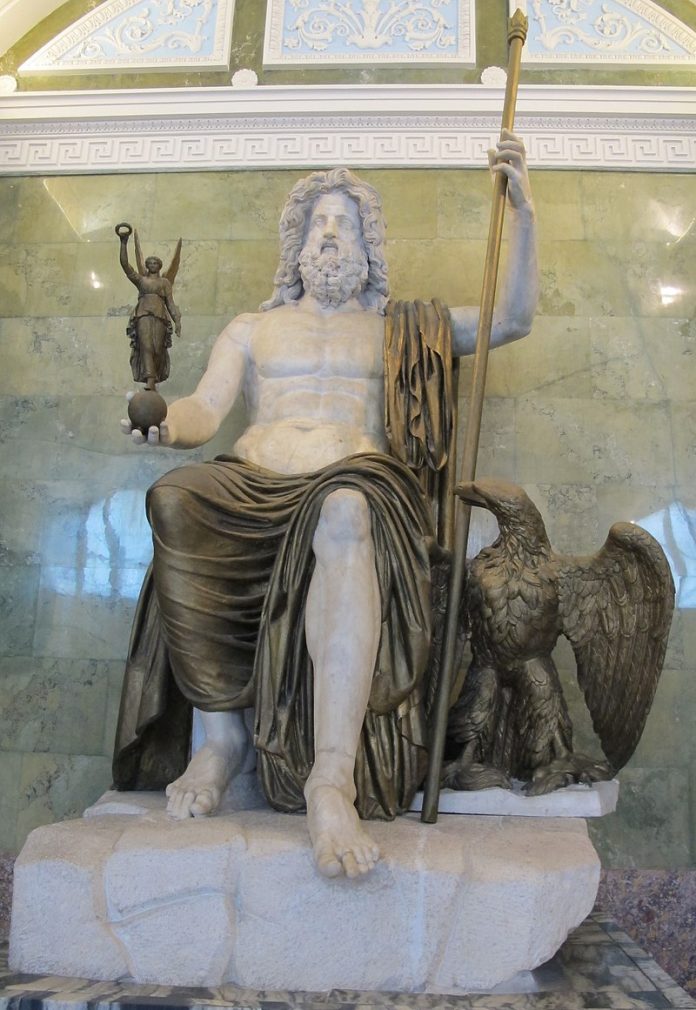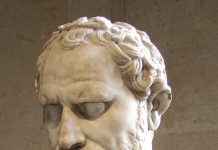In this very personal look at the Roman god Jupiter, King of the Gods, Baylor University professor Julia Dyson Hejduk has given us in her new book the first fully scholarly treatment of the god as a character in his own right.
To accomplish this she examines the texts of five Augustan poets (that is, poets from the age of the first Roman emperor, Augustus) who, after years of study, have become her friends. This intimate approach saves the book from being the typical dry-as-dust professional treatise. Any Latin in the book is translated into English, and since much of the book deals with Jupiter’s sexual adventures, there is no lack of titillating (or disturbing) material. “My exploration of Jupiter attempts to shed light on the unique personalities of five men, and I ultimately decided that the best way to create a nuanced portrait of each was to examine them separately.”
The five poets are Virgil, Horace, Tibullus, Propertius, and Ovid. Naturally each poet tells of Jupiter in different ways, leading to “paradoxes and contradictions, such as the perennial tension between Lover and Thunderer.” This, Hejduk admits, is reflected in a certain “shizophrenic quality” in what we learn of the god.
In her first poet, Virgil, the author sees a direct comparison between the meaning of his poetry and modern American politics. “After thirty years of reading this poet, I am convinced that if there is a coherent meaning to his poems, it must reside partly in his carefully crafted insolubility. I believe he was plagued throughout his life by this question: Looking at the same data set how can two decent, intelligent people, who ostensibly share the same values, come to opposite conclusions that can tear a community apart (a question made very real to Americans in the wake of the 2016 election.)” We can certainly update Hejduk’s concern with a force magnifier for the 2020 election.
In a 63-page chapter, the author traces what she terms Jupiter’s trajectory through the extant poems of Virgil. Since there is no unifying, single answer in Virgil to any of a host of questions, we are left with a series of counterfactuals. In the Aeneid, for example, Jupiter plays a key role in a human sacrifice with which the poem ends. In a passage most readers see as Jupiter’s lowest point, Virgil embeds a moral affirmation of the god, who as a matter of justice “frightens cities that deserve it with war.” Hejduk has no answer as to why the only assertion of Jupiter’s justice is placed within a narrative of human sacrifice.
But she does have an opinion on a pair of questions that are asked in the poem: “Is such great wrath in the minds of the gods above?; Did it please you, Jupiter, for peoples destined for eternal peace to clash with such strife?” Hejduk explains that the first “asks about the problem of Evil in general; the second asks about the specific evil endemic to Roman history, civil war.” Her answer to both is a sobering Yes.
All this relates to the wrath of Jupiter, his role as Thunderer. The best place to see his other major role at work is in the poetry of Tibullus (where she has a section on Jupiter the Lover and the Enemy of Love) and that of Ovid. Everyone knows of Helen who had the face that launched a thousand ships, and the Trojan War. What you might not know is that her father was none other than Jupiter. In Ovid’s Heroides, Helen is ambivalent “about which aspect of Jupiter to emphasize- his glory as a father, his attractiveness as a lover, or his deceptiveness as a seducer.” This poignant mixture of shame and pride reflects on her own character, so when she makes much of her affronted chastity when Paris makes his advances to her, it quickly crumbles when confronted with the weapon he uses: “his sexual attractiveness.” Hejduk sees this as an example of “the paradoxes of human desire.” Through his many poems, “Ovid is the one who brings Jupiter down to earth, even as he blatantly sends Augustus to heaven.” The god of Rome became Caesar.
To be clear, Hejduk looks here at Jupiter, not his Greek counterpart Zeus. Thus we see the king of the gods through the eyes of Romans, not the Greeks who preceded them. Zeus does make the occasional appearance, as the Augustan poets did much to rework the original exploits of Zeus in a Roman context, but you will not, for example, find the creation of man and woman here, as described in Hesiod.
This is a very fine book which will have a broad appeal ranging from gender studies and mythological research to the larger Classical audience and anyone interested in ancient Rome, especially its theological beliefs.
There is a translation error of a line by Propertius on page 191. The text reads “That goddess who so often kept longing lovers 379 apart.” Clearly, the insertion of “379” was a mistake.
The God of Rome is $74 from Oxford University Press.














